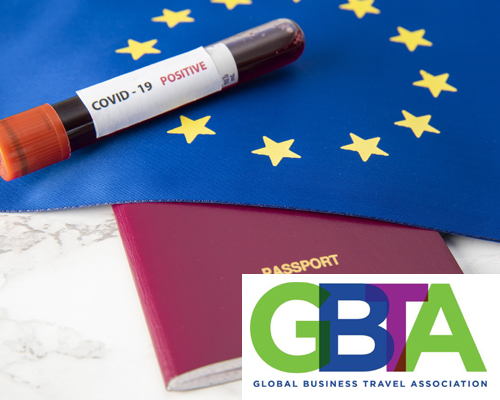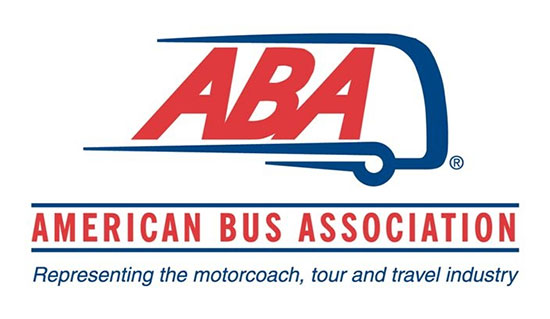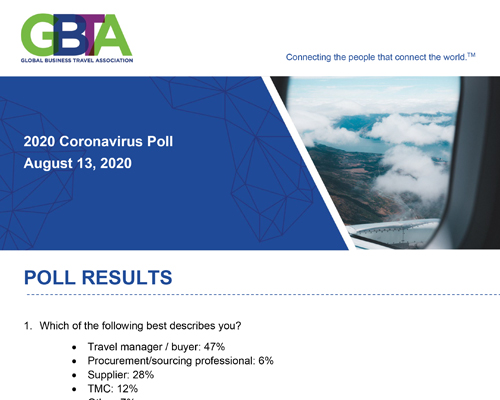- Details
- Category: Industry News
Global Business Travel Association (GBTA) member companies worldwide report an emerging willingness to permit employees to engage in domestic business travel, according to the latest poll conducted by the association between August 5-9, 2020.
Respondents to the poll, the 10th biweekly survey conducted among GBTA’s members since the onset of the pandemic in February, continue to report virtually no willingness for employees to travel internationally, with 93 percent indicating the pandemic has curtailed all or most international business trips. By comparison, 74 percent of respondents report that the pandemic has curtailed all or most of their organization’s domestic business trips.
That number has fallen by 19 percentage points since GBTA’s mid-April poll of members and the lowest level since the pre-pandemic polling in late winter 2020.
“The business travel landscape continues to be difficult in Europe and the U.S., but we do see some small glimmers of recovery here and there,” said GBTA Interim Executive Director Dave Hilfman. “More companies look to be trending positively on domestic trips, with Europe still showing the most positive uplift.”
In Europe, the outlook remains more positive as 70 percent of GBTA members in Europe expect domestic business travel to return in the next 2-3 months compared to just 26 percent in North America. Likewise, members based in Europe are more likely to expect international business travel to resume in the next 2-3 months (20 percent) than members based in North America (9 percent).
Three in four respondents (74 percent) report that their company has started to formulate a travel recovery plan. Tighter booking channels are a trend, with 66 percent of respondents stating they are less likely to allow travelers to book directly with suppliers and 65 percent are less likely to allow travelers to book with an online travel agency than before the pandemic.
When asked about new safety measures, personal protective equipment (PPE) is the new business travel accessory. One-third (31 percent) of GBTA member companies plan to provide PPE for their travelers while 20 percent require their travelers to provide their own as an essential item for their safe return to travel. Only 6 percent report that their company is not making PPE mandatory for travelers.
While recovery plans are underway, the return to travel remains slow and is taking longer than previously expected. Suppliers (84 percent) are more likely than travel managers (73 percent) to say that business travel has resumed more slowly than they had originally expected.
“It is encouraging to see so many members companies working on travel recovery plans in preparation for their return to travel, with virtually all our members keeping employees’ health and safety as their primary concern,” says Hilfman. “New considerations such as PPE are being added to travel policy and GBTA is supporting members and the industry to ensure consistent health and safety measures across all sectors on a global basis.”
View the entire poll results here
Methodology
GBTA conducted a poll of its members across the globe from August 5-8, 2020. A total of 827 responses were received.
Visit gbta.org for more information.
[08.14.20]
- Details
- Category: Industry News
The Global Business Travel Association (GBTA), an organization that represents the interests of the international business travel community, recently released a press release emphasizing the importance of cooperation between the EU, Canada, and the U.S. to restore safe travels and reboot the economy. GBTA is urging the European Commission, EU governments, Ottawa, and the White House to pursue talks to find a resolution for transatlantic travel, based on reciprocity, proportionality, and the latest scientific advice.

Due to COVID-19, both Canada and numerous member countries of the EU have restricted all non-essential travel (e.g., tourism) for U.S. travelers, citing the increasing numbers of positive cases in the States. A number of other countries, including those on the African and Asian continents, have closed to their borders to all travelers.
 Interim Executive Director of GBTA Dave Hilfman
Interim Executive Director of GBTA Dave Hilfman
“GBTA has repeatedly called on these governments to adopt a coordinated approach in responding to COVID-19 and the evolving situation. As a select number of countries recently chose to reinstate travel restrictions, we would like to stress the importance of closely following the recommendations of the European Centre for Disease Prevention and Control (ECDC), the U.S. Centers for Disease Control and Prevention (CDC), the Public Health Agency of Canada and the World Health Organization (WHO) to ensure consistency and restore consumer confidence in air travel,” said GBTA Interim Executive Director Dave Hilfman. “We encourage open conversations to continue, as well as appropriate communication to the general public. Maintaining transatlantic ties is in the interest of citizens and the economy.”
“Safety is paramount and should weigh heavily in discussions of restarting travel. Contact-tracing applications can effectively help fight the pandemic but can only do so if they are subject to a common set of standards to enable rapid exchange of information and limit the risks of further outbreaks,” said Mark Cuschieri, GBTA Chair European Advisory Board.
You can view a full list of restrictions to and from the U.S. here or here.
Visit gbta.org for more information.
[08.14.20]
- Details
- Category: Industry News
Congress is currently deliberating the next package of aid to American citizens and businesses as COVID-19’s effects linger. With the election less than 85 days away—and early voting starting in a few weeks—politicking is getting in the way of meaningful legislation.
Behind the scenes, the American Bus Association (ABA) and United Motorcoach Association (UMA) continue to push hard for legislation that would assist the struggling bus industry, which has been largely sidelined since mid-March. Among the major bills still circulating are the Senate’s Reviving the Economy Sustainably Towards a Recovery in 2020 (RESTART) Act, or S.3814, as well as Continuing Small Business Recovery and Paycheck Protection Program Act, or S.4321, both of which would extend the popular PPP loans to small businesses.

However, the bills with the greatest potential impact on the industry are the Senate’s and House’s CERTS Act (S.4150 and H.R.7642, respectively), which each have broad bipartisan support and would offer $10 billion in grants and loans to help sustain the recovery of motorcoach companies. Now that both houses of Congress are again on recess, and with election fervor heating up, the larger and more wide-sweeping issues that most affect the general population are being tackled first. President Trump’s executive orders over the weekend also added a wrinkle to the negotiations on unemployment and stimulus checks.

Both UMA and ABA are urging operators and friends of the industry to write, call, and visit representatives—including those outside their state or district—to keep the pressure on. The airline industry, which has seen an increase in traffic in the past month, is asking for an additional $25 billion in aid after receiving $50 billion early in the crisis. As the bus industry isn’t likely to see meaningful recovery until 2021 as many events, sports, and tourism remain stagnant, the aid is critical. The ABA’s research arm, the American Bus Association Foundation, released its second-quarter 2020 Motorcoach Builder Survey that showed just how deep the impact has been on the overall industry.
Visit UMA’s and ABA’s contact pages for form letters and more information on state and local representatives.
UMA hosts its Town Hall each Thursday at 2PM ET. Register for the event here. The next installment of the UMA’s Virtual Summit, which first debuted in June, will take place on August 12 at 11AM ET.
ABA will hold a Virtual Town Hall on August 18 from 2-3PM ET. Click here for more information and to register.
[08.11.20]


